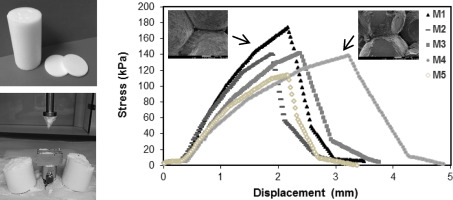The mechanical characteristics of a paraffin–vegetable oil material and the compressive behavior of the powder stemming from this material were used to estimate the resistance of the compressed samples. The compressive behavior of powders under the low pressure range (1–2 MPa) applied in the candle industry was investigated in order to predict the tensile strength of the compressed samples. Compressive behavior was evaluated under lab conditions similar to those practiced in the candle industry. Compressive behavior of the powders, which represents the resistance of the particles to rearrangement during the packing step, Kp (30.98 ± 1.20 kPa of the mixture M1), was positively correlated to tensile strength of the compressed samples, σt (175.46 ± 3.61 kPa of mixture M1). Tensile strength of the compacts was also related to the mechanical properties of the raw material: high tensile strength was linked to low ductility (γMR), high mechanical strength (RMR) and high Young's modulus (E) of the material. Formulation—particularly the presence of a lubricant of mineral (0.52%) and vegetable (44.1%) origin in mixture M5—was found to strongly influence the mechanical properties of the compressed samples (σt = 115.52 ± 2.42 kPa).

